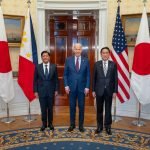A flood of important visitors has hit Skopje, and this is continuing, clearly part of a coordinated work program to “save the referendum” by pro-NATO and pro-EU enlargement leaders. Last week Skopje saw key EU leaders and NATO officials fly in, while this week additional EU Commission and American officials are making the pilgrimage to support Macedonia/FYROM Prime Minister Zoran Zaev as the September 30 referendum rapidly approaches.
Focused Western leadership drive to deliver a positive referendum vote
Over the summer months, the government’s energy in Macedonia/FYROM was directed towards preparing for the September 30 referendum envisioned by the Prespes Agreement. From a negative starting point, local polls are currently showing a slight but steady movement towards a “YES” vote. Foreign support for the referendum is seen as essential to give Zaev the edge he needs, at least to achieve the required 50% turnout for this consultative referendum.
The flood of important visitors has hit Skopje and continues, no doubt in a coordinated effort to “save the referendum” by pro-NATO and pro-EU enlargement leaders. Historically, crucial elections in Macedonia/FYROM have been preceded by important visitors supporting the democratic cause of the day so this wave of visits is not all that unusual when seen in that context.
General Secretary of NATO Jens Stoltenberg visited on September 5, followed by Austrian Chancellor Sebastian Kurz who passed through on September 7, and German Chancellor Angela Merkel‘s September 8 visit. US Senator Ron Johnson, who sits on the Senate subcommittee responsible for European and regional security, travelled to Skopje from Thessaloniki on September 9, where he attended the VIP-heavy opening of the US Pavilion at the 83rd Thessaloniki International Fair (TIF) the day before.
The influx continued on September 12 with Dutch Foreign Minister Stef Blok, and Kosovo Prime Minister Hashim Thaci visiting. The EU’s foreign policy chief Federica Mogherini and US Assistant Secretary of State for European Affairs Wess Mitchell arrived on September 13 just hours after Zaev delivered a passionate speech defending the Prespes Agreement and upcoming referendum process at the European Parliament plenary in Strasbourg, referring to the “people of Macedonia”.
Pleasure to welcome A/S Wess Mitchell to @MFA_Macedonia Grateful for the clear US support ahead of the 30 September referendum. NATO membership is finally within reach. We are determined to seize this historic opportunity, making Macedonia & the Balkans more secure and prosperous pic.twitter.com/24E1iDElVv
— Nikola Dimitrov (@Dimitrov_Nikola) September 13, 2018
US Secretary of Defense James Mattis is scheduled to arrive in Skopje around September 16 to “show U.S. support for Macedonia (FYROM) during NATO accession and continued US commitment to peace and security in the region”, according to the Defense Department. Mattis has voiced concern about possible acts of “mischief” by Russia in trying to block Macedonia/FYROM’s path to NATO membership, some of which led to expulsions of Russian diplomats from Greece and the denial of travel permission to others, along with angry Russian countermeasures, over the summer.
Opposition resolve may be weakening
There are indications this withering barrage unleashed by foreign leaders in support of the referendum is having the desired impact. VMRO-DPMNE leader Hristijan Mickoski, whose party vehemently opposes the Prespes Agreement signed with Greece in June which will change the name of the former Yugoslav republic to the “Republic of North Macedonia”, did not call for a boycott of the referendum set for September 30.
The vote was up to “each individual, with their conscience and morals” to “decide what’s best for their family and our beloved Macedonia”, Mickoski noted in comments the party published on its site on September 12. It’s still unclear what opposition supporters will do and if Mickoski was simply changing tack to avoid criticism from the visitors, many of whom seek to meet with his party’s representatives.
Name Dispute front and centre in Thessaloniki
It had been understood that the debate over the Prespes Agreement would return to centre stage in Greek politics at the September 8 launch of the Thessaloniki International Fair and the assemblage of senior politicians and journalists in one venue produced exactly that result. While groups opposed to the Prespes Agreement demonstrated outside the TIF’s gates on September 8, with some violence reported, Greek Prime Minister Alexis Tsipras strongly defended the agreement in his optimistic post-bailout keynote speech that evening, calling for Thessaloniki to become a bridge to the region and not a Greek defensive wall.
The leader of the Independent Greeks (ANEL) party and Defence Minister Panos Kammenos repeated his threats to resist the ratification of the Prespes deal in his party-organized press conference at the TIF September 11. He said his party had done the right thing for the country by not acting earlier this year to trigger an immediate government collapse and elections before Greece officially exited its bailout program on August 20. Now, however, other options were open for the country, he noted.
A large demonstration opposing the Prespes Agreement is being organized for September 30.







